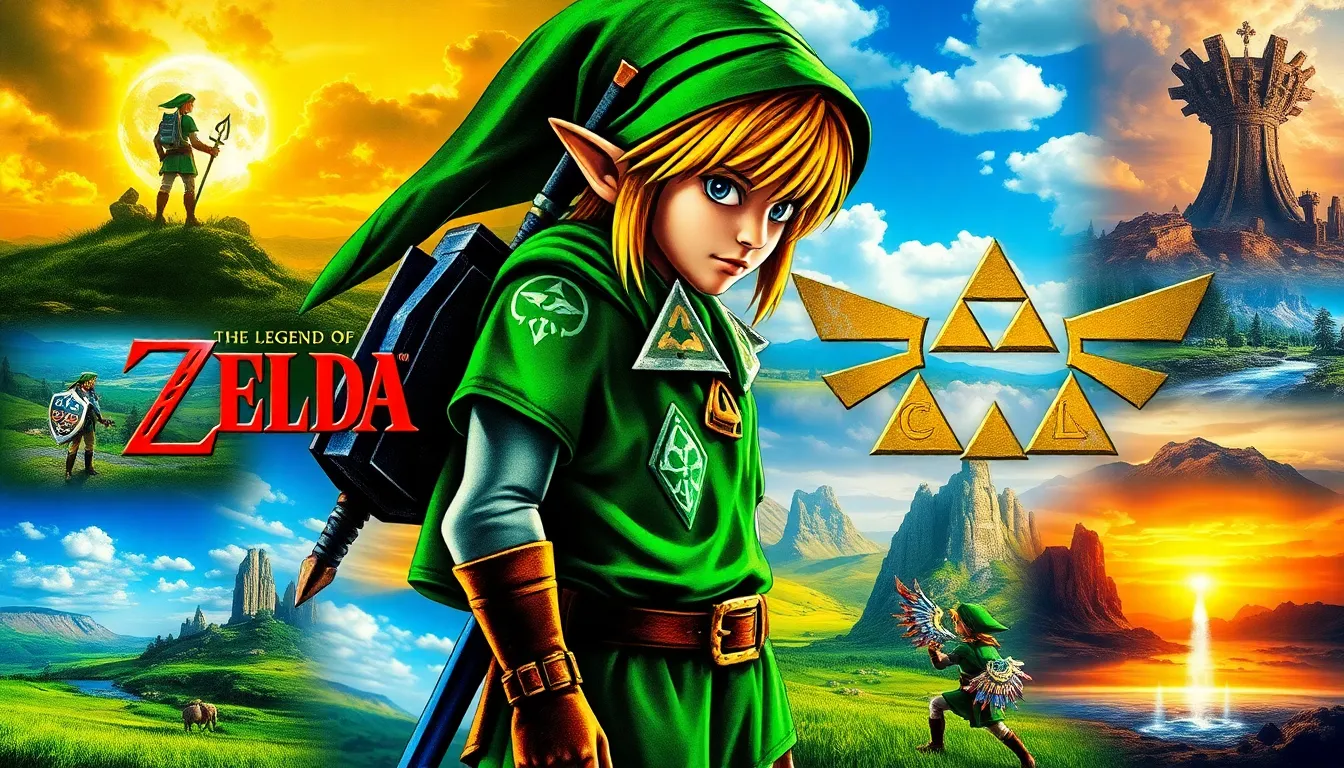The Legend of Zelda series has captivated gamers for decades, weaving intricate tales of adventure, heroism, and mystery. From its humble beginnings on the NES to the expansive worlds of modern titles, Zelda has left an indelible mark on video game history. Fans of all ages have explored Hyrule, battled iconic foes, and solved countless puzzles, but how well do they really know this beloved franchise?
Dive into the fascinating world of Zelda trivia and discover surprising facts that even the most devoted players might not know. Whether it’s hidden references, development secrets, or character backstories, there’s a treasure trove of knowledge waiting to be unearthed. Get ready to test your Zelda expertise and impress your friends with insights that go beyond the gameplay.
Table of Contents
ToggleOverview of Zelda Trivia
The Legend of Zelda series is filled with fascinating details and lesser-known facts that enrich the gaming experience. Trivia encompasses various aspects, from character origins to game mechanics and hidden Easter eggs.
Character Origins
- Link’s appearance draws inspiration from Peter Pan, designed to reflect youthful adventure and innocence.
- Princess Zelda’s name derives from Zelda Fitzgerald, symbolizing beauty and complexity, aligning with her role in the series.
- Ganon, known for his dark powers, has roots in various mythologies, showcasing his complexity as a villain.
Game Mechanics
- The series introduced gameplay elements like cutting grass for resources, setting a precedent for open-world exploration.
- Heart Containers provide health benefits, incorporating strategy into character progression and combat.
- The original game featured a non-linear storyline, allowing players to tackle challenges in their chosen order, enhancing replayability.
Hidden Easter Eggs
- Secret items and locations often reference previous Nintendo games, creating cross-game connections that engage dedicated fans.
- Specific in-game character dialogues hint at real-life events or pop culture phenomena, adding layers to the narrative.
- Unexpected encounters with non-playable characters sometimes provide humorous or cryptic insights into the game world.
Development Secrets
- Game development teams often include nods to past staff members, preserving the legacy of contributors throughout the series.
- Initial game designs frequently underwent significant changes, shaping the final products in unexpected ways.
- Conceptual art reveals alternate takes on iconic characters and settings, illustrating the iterative process of game design.
Zelda trivia enhances appreciation for the series, inviting fans to explore the intricate world crafted by Nintendo. This knowledge not only deepens engagement but also fosters discussions among fellow enthusiasts.
Fun Facts About The Zelda Series

The Legend of Zelda series boasts a wealth of intriguing trivia that deepens its rich lore. From game releases to character origins, here are some captivating insights.
Game Releases and Popularity
The Zelda series began with its debut title in 1986. Each installment garnered critical and commercial success, creating a dedicated fanbase. The series features over 20 games across various platforms, including handheld consoles and home consoles. “The Legend of Zelda: Ocarina of Time” set a benchmark as one of the greatest games of all time, with a Metacritic score of 99. The 2021 release of “The Legend of Zelda: Skyward Sword HD” rejuvenated interest in the franchise, proving its longevity. The series has sold over 125 million copies worldwide, showcasing its significant impact on gaming culture.
Iconic Characters and Their Origins
Characters within the Zelda series draw inspiration from various sources. Link’s design reflects elements of Peter Pan, embodying the spirit of adventure. Princess Zelda is named after Zelda Fitzgerald, a famous American socialite, highlighting her importance in the narrative. Ganon, the primary antagonist, integrates mythological influences, including the boar from Japanese folklore. Other memorable characters, like Navi and Tingle, exhibit unique traits that contribute to their fan-favorite status. Each character’s backstory enriches the overall narrative, deepening player engagement and familiarity with the franchise’s universe.
Notable Gameplay Mechanics
The Legend of Zelda series introduces numerous gameplay mechanics that have evolved over time, enhancing player experiences and engagement. These mechanics contribute to the franchise’s innovative reputation.
Evolution of Game Mechanics
Game mechanics in The Legend of Zelda series have transformed significantly since the original release in 1986. Early titles introduced basic elements such as exploration and puzzle-solving. Over the years, the inclusion of features like context-sensitive controls and the use of 3D environments in “The Legend of Zelda: Ocarina of Time” enhanced immersion. Subsequent entries introduced mechanics such as crafting and character abilities, allowing for greater freedom in gameplay. “The Legend of Zelda: Breath of the Wild” showcased an open-world format, combining physics-based interactions and survival aspects, demonstrating continual innovation.
Unique Features Across Titles
Each Zelda title offers unique features that distinguish them within the series.
- “The Legend of Zelda: Link’s Awakening”: This entry is notable for its distinctive art style and the introduction of a dream world, emphasizing narrative depth.
- “The Legend of Zelda: Majora’s Mask”: It implemented a time-based mechanic, where players navigate a repeating three-day cycle, enhancing urgency and strategy.
- “The Legend of Zelda: Wind Waker”: This game features a sailing mechanic, introducing a vast ocean to explore, combining adventure with discovery.
- “The Legend of Zelda: Twilight Princess”: This title emphasizes dark themes and realism, introducing wolf transformation as a gameplay style variation.
- “The Legend of Zelda: Breath of the Wild”: It integrates environmental interactions and multiple ways to approach challenges, encouraging creativity and exploration.
These mechanics not only enrich gameplay but also enhance player engagement and creativity within the series, reflecting the ongoing evolution of video game design.
Influence on Gaming Culture
The Legend of Zelda series significantly shapes gaming culture, influencing designs, mechanics, and community engagement. Its creativity extends beyond gameplay into merchandise and fan communities, showcasing its lasting legacy.
Impact on Other Games
The Legend of Zelda’s innovation set benchmarks for the gaming industry. Influential mechanics, like open-world exploration from “Breath of the Wild,” inspired numerous titles across genres, fostering a demand for more immersive experiences. Games such as “Dark Souls” and “The Witcher” drew elements from Zelda’s challenge and world-building. Iconic puzzles and adventure elements appear in franchises like “God of War” and “Horizon Zero Dawn,” demonstrating Zelda’s reach. Additionally, the success of Zelda encouraged developers to prioritize story-rich narratives and dynamic gameplay, elevating industry standards.
Zelda Merchandise and Community
Zelda’s merchandising reflects its massive popularity. The franchise includes action figures, clothing, art books, and collectibles, which strengthen its cultural presence. Events like “Zelda Symphony of the Goddesses” celebrate its music, attracting fans globally. Fan conventions feature cosplay and merchandise, fostering a tight-knit community. Online forums and social media groups share theories, fan art, and gameplay strategies, nurturing passionate discussions. This engagement underlines Zelda’s integral role in shaping fan culture, blending creativity with a sense of belonging among gamers.
Trivia Challenges for Fans
Zelda trivia challenges provide fans an engaging way to test their knowledge of the beloved series. Various options exist for fans to delve deeper into the lore and history of Zelda through quizzes and interactive experiences.
Quizzes and Games to Test Knowledge
Numerous quizzes and games are available for fans to challenge their understanding of the series. Websites like Sporcle and Quizlet offer Zelda-specific quizzes that cover game mechanics, character details, and storyline elements. Trivia apps such as “Zelda Quiz” feature multiple choice questions that span the franchise’s extensive history, from classic titles to recent releases. Additionally, fans can enjoy social media challenges, where they guess images or quotes from the games. These interactive formats promote both fun and learning, enhancing appreciation for the series.
Online Communities and Platforms
Online communities serve as valuable platforms for Zelda enthusiasts to connect and share trivia. Websites like Reddit host dedicated subreddits, such as r/Zelda, where fans discuss game lore, post trivia, and share unique insights. Discord servers often feature trivia nights, fostering live interaction and competition among members. Social media platforms, including Twitter and Instagram, showcase trivia challenges through fan-generated content, inviting followers to participate. These communities create a dynamic environment that contributes to the ongoing conversation and exploration of Zelda trivia.
The world of The Legend of Zelda is filled with rich narratives and captivating trivia that enhance the gaming experience. Fans can dive deeper into the lore and uncover hidden gems that make the series even more enjoyable. Engaging with trivia not only sparks conversations but also strengthens the sense of community among players.
Exploring these lesser-known facts offers a unique perspective on beloved characters and mechanics. Whether through quizzes or discussions in online forums, the pursuit of knowledge about Zelda continues to inspire and connect fans worldwide. This enduring franchise remains a testament to creativity and innovation in gaming culture.




